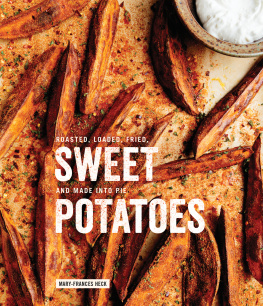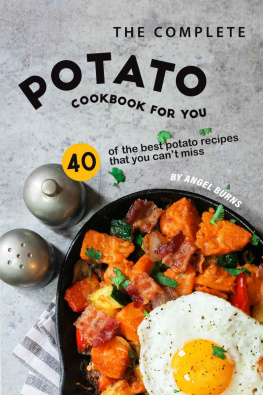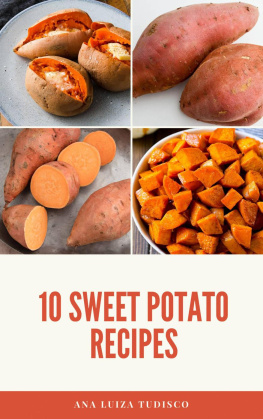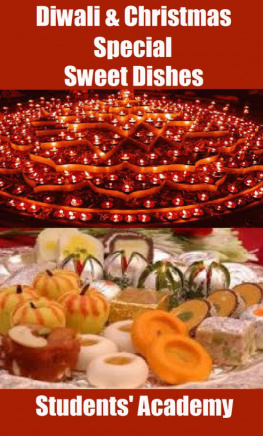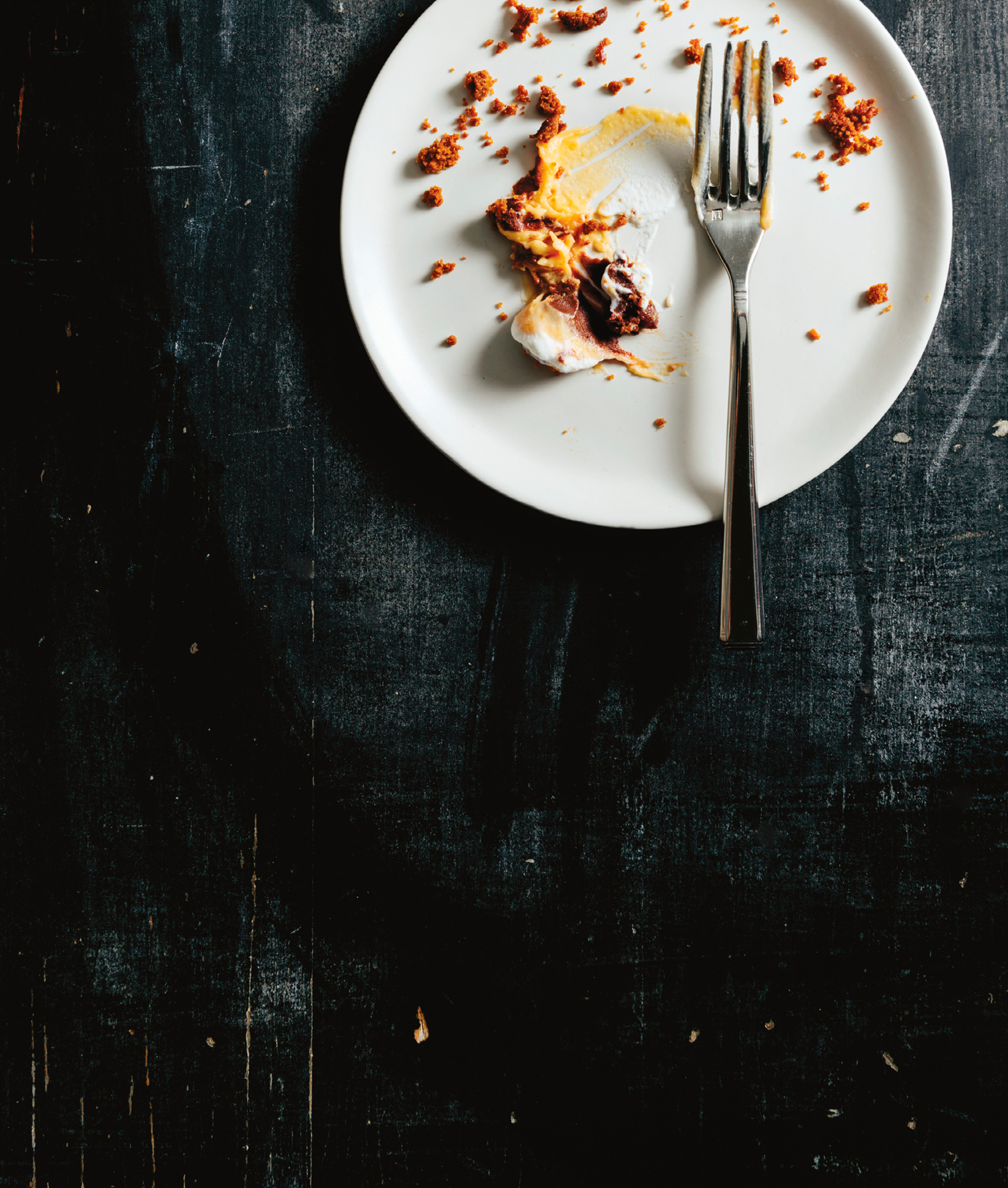MARY-FRANCES HECK is a food writer, recipe developer, and chef. She is the former test kitchen director of Bon Apptit, and her editorial work has appeared in numerous magazines, including Lucky Peach, Saveur, Cooking Light, Rachel Ray Every Day, Redbook, Rodales Organic Life, Self, Shape, and Fitness. Her recipes and writing have appeared in many cookbooks, such as Lucky Peach Presents 101 Easy Asian Recipes, The Wurst of Lucky Peach, Lucky Peach Presents Power Vegetables!, All About Eggs, and Justin Smillies Slow Fires. When shes not cooking, you can find Mary-Frances riding her bike or digging in the garden.
ACKNOWLEDGMENTS
Thanks to all the editors I have had the pleasure of working with and learning from over the years: Hunter Lewis, who hired me out of culinary school to work in the kitchens at Saveur and Bon Apptit; the whole editorial team at Lucky Peach, especially Peter Meehan, who has elevated recipe writing to an art form; and Ashley Meyer, who lassoed me into this project and has thoughtfully and gently steered me through the cookbook writing process.
To my parents, Bill and Katy, whose love, support, and stocked pantry encouraged me to tinker with food as a kid and to pursue a career in cooking. To my brother, Lou, the best kitchen assistant and eating buddy a girl could ask for, and to my sisters, Madeleine and Juliana, who helped taste, test, and critique these dishes.
To the Gorham-Sherlock clan, for their hospitality, generosity, and willingness to eat sweet potatoes everyday.
To those who contributed recipes, ideas, and sweet potato insights: Cara Chigazola and Ana Sortun, whose recipe from Oleana appears on the cover, Emily Toubali, Gerard Craft, Travis Flood, Hannah Clark, Betsy Rodriguez, Stuart Brioza, Malorie Sellers, Ashley Kemper, Andrea Nguyen, and Rachel Khong.
To Sarah Smith and David Black, for their guidance navigating the world of books.
To the team at Clarkson Potter for their hard work and creativity: Doris Cooper, Aaron Wehner, Todd Berman, Kevin Garcia, Cathy Hennessy, Stephanie Huntwork, Sonia Persad, Kathy Brock, Danielle Daitch, and Alexandria Martinez.
To the Smokey Roots: Kristin Teig, Catrine Kelty, and Joseph Ferraro, whose vibrant photography and styling bring these recipes to life.
And thanks most of all to my partner, Tiffany, who has eaten and critiqued every recipe in this book and still loves me and sweet potatoes. Your honesty, encouragement, and patience keep me focused on what really matters.
IN THE ROUGH
STEAMED
SWEET POTATOES
Steaming sweet potatoes in batons or bite-size pieces is the best choice for when you want their sharp corners maintained and a moist result. This cooking method is the perfect way to prepare sweet potatoes for pickling (see ). Try cooled steamed sweet potatoes as crudits, or simply dress them with a little vinaigrette and they become an open-the-fridge-and-feed-yourself snack.
SERVES 4
2 pounds orange- or white-fleshed sweet potatoes
- In a large saucepan or pot fitted with a steamer basket, pour water to a depth of at least 2 inches. Cover, set over medium-high heat, and bring the water to a boil.
- Meanwhile, peel the sweet potatoes and cut them into uniform pieces, less than 1 inch thick, in any shape youd like.
- When steam whistles from the saucepan, quickly and carefully (steam is hot!) add the pieces of sweet potato to the steamer basket. Re-cover the pot and steam the sweet potatoes until a cake tester or paring knife meets the tiniest, barely noticeable bit of resistance in the center of a couple of pieces, 10 to 15 minutes, depending on size and shape. They should be cooked through but retain enough structure not to fall apart. Transfer the sweet potatoes to a plate or shallow dish and let cool.
TIP: Make sure to cut the sweet potatoes into uniform pieces cubes, batons, or slicesso they cook evenly and hold their shape.
OVEN-ROASTED
SWEET POTATOES
Roasting sweet potatoes may seem like a no-brainer, but, as George Washington Carver wisely wrote, A sweet potato cooked quickly is not well cooked. Time is an essential element. Twenty minutes may serve to bake a sweet potato so that a hungry man can eat it, but if the flavor is an object, it should be kept in the oven for an hour.
Starting the sweet potatoes in a cool oven, whenever possible, warms the flesh slowly and evenly without turning the skin into inedible jerky. The sweet potatoes may become tender before they are fully delicious; look for caramelized juice bubbling from the ends of the sweet potatoes and collapsed skin.
SERVES 4
2 pounds orange-fleshed sweet potatoes, scrubbed
Unsalted butter, for serving (optional)
Kosher or flaky sea salt, for serving (optional)
- Line a rimmed baking sheet with aluminum foil or parchment paper. Use a fork to prick the sweet potatoes in several places; then arrange the sweet potatoes in a single layer on the baking sheet. Place the baking sheet on the middle rack of the oven and heat the oven to 350F.
- Bake the sweet potatoes until their juices bubble like lava from the volcanic ends and pricked skin, caramelizing into a dark pumice, and the skin has softened, dried out, and collapsed onto the flesh, an hour, give or take, depending on the weight and width of your sweet potatoes. It may take up to 2 hours for very large ones weighing more than 1 pound. Remove the sweet potatoes from the oven and let them rest until their juices no longer flow, about 5 minutes. Serve hot with butter and salt, if desired.
TIPS: When roasting at high altitude, root vegetables can take up to twice as long to become tender, so plan accordingly.
When roasting whole sweet potatoes, always line the baking sheet or dish with foil or parchment, as the caramelized sweet potato juices are difficult to clean off the pan.
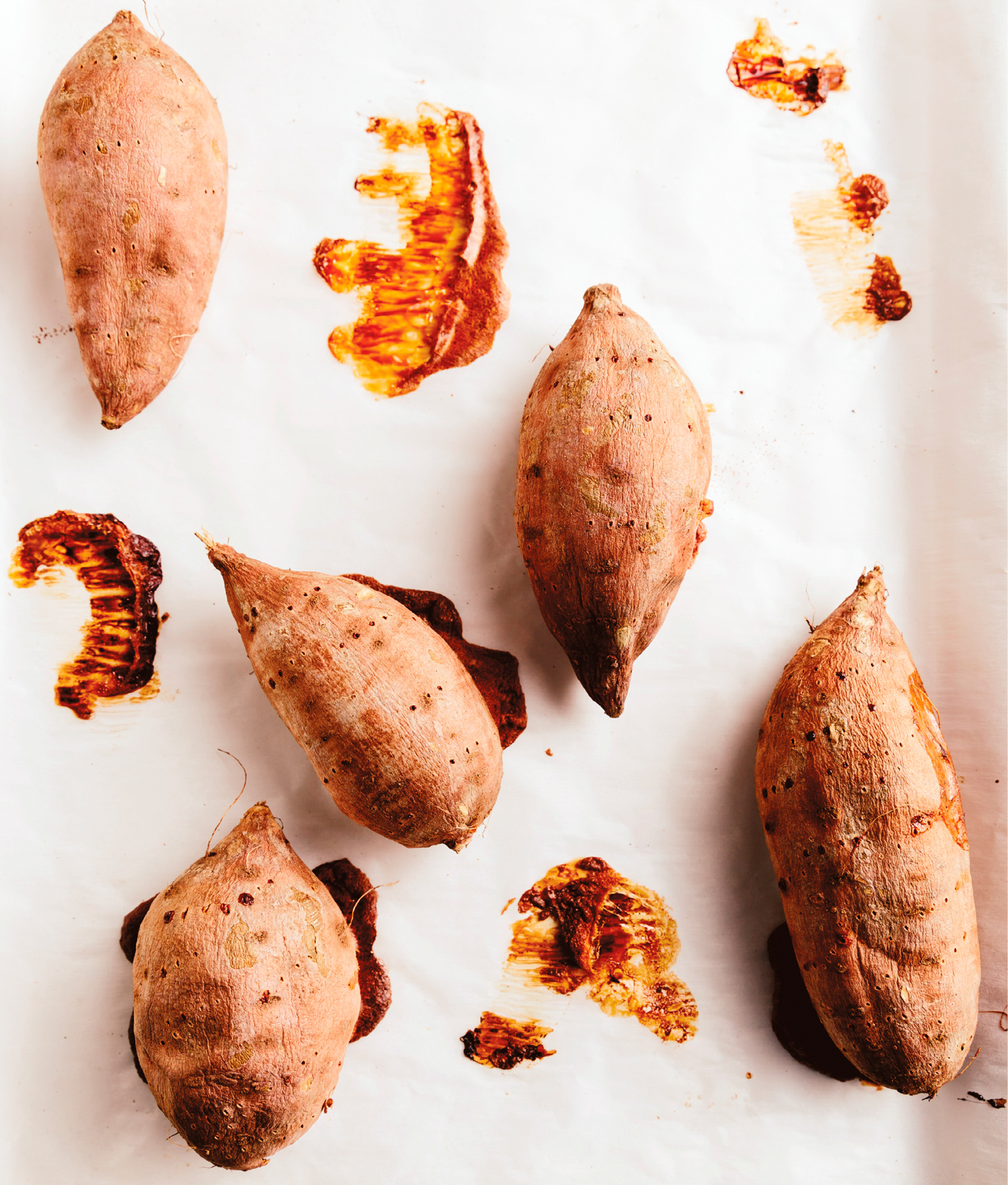
COAL-ROASTED
SWEET POTATOES
This is perhaps the first way humans cooked sweet potatoes nearly ten thousand years ago. Coal-roasting sweet potatoes yields fluffy, smoky flesh. When the skins are cracked open, they are the perfect vehicle for Sambal Butter () or a dollop of skyr or crme frache. Make sure to brush away the ashes, leaving bits of crusty, charred skin for textural contrast. As the name implies, you will need a hardwood or charcoal fire, burned down to embers, for this recipe. A pair of long metal tongs and a metal shovel of sorts, preferably a wok spatula with a wooden handle, are essential tools and are available for a couple of bucks at kitchen supply stores.
SERVES 4
4 medium or large orange-, white-, or purple-fleshed sweet potatoes (2 to 3 pounds)
- Build a large wood fire in a pit or a charcoal fire in a kettle grill. (If using a grill, remove the cooking grate and set it aside while positioning the sweet potatoes; the grate may be returned and used for cooking other items once the sweet potatoes are buried.) If desired, individually wrap each sweet potato in a sheet of foil.
- When the flames from the fire subside and the coals are covered in a thick layer of gray ash, after about 15 minutes, arrange half of the coals in an even bed. Nestle the sweet potatoes into the coals and use the wok spatula to scoop the remaining embers over and around the sweet potatoes to completely bury them. (It may seem counterintuitive, but any area not smothered in coals is more likely to flare up and burn an inedible charred spot on the sweet potato.) Cook the sweet potatoes without disturbing them for about 20 minutes.
Next page
